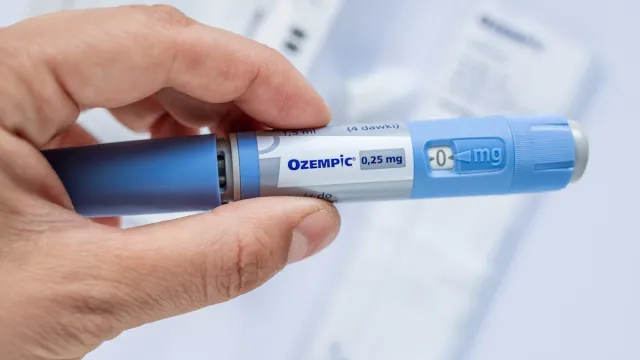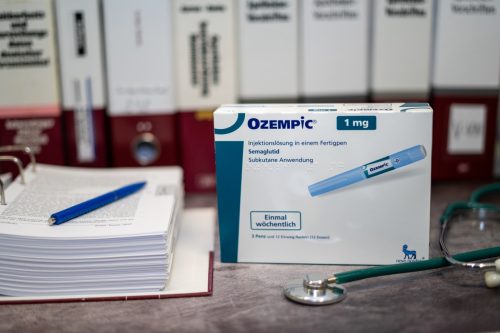Ozempic Patients Report Debilitating New Side Effect: “Wish I Never Touched It”

Weight loss is always a hot topic, but these days, it’s become less of a debate about diet and exercise and more a conversation about drugs like Ozempic or Wegovy (brand names for semaglutide injection). These drugs, used to treat diabetes and obesity, have helped people drop stubborn pounds quickly, making them popular among celebrities and the general public. But with little known about the long-term implications of the injections, patients and healthcare professionals are learning about potential unpleasant side effects along the way. Now, some are reporting a painful new condition that doctors believe may be connected to Ozempic and Wegovy use. Read on to find out why some patients are saying they wish they’d “never touched” these drugs.
RELATED: 4 Foods That Spike the Same Weight Loss Hormone as Ozempic, Experts Say.
Patients are being diagnosed with a serious stomach condition.

Ozempic, which is primarily prescribed for diabetes, and Wegovy, which can be prescribed for obesity, both work by mimicking the GLP-1 hormone. One of the hormone’s functions is to slow the pace at which food passes through the stomach—elongating the feeling of being “full.” However, it’s problematic when digestion slows too much, CNN reports.
Patients taking Wegovy and Ozempic are now being diagnosed with stomach paralysis, the outlet reported—and doctors think that the drugs may have caused or exacerbated the condition. According to Cleveland Clinic, the disorder is formally known as gastroparesis, which affects the nerves and muscles in the stomach, slowing and weakening the muscle contractions you need to digest and pass food through your intestines.
RELATED: 4 Best Ways to Lose Weight (Without Using Ozempic).
Patients say that they wish they’d “never heard of” Ozempic.

CNN spoke with several patients who have been diagnosed with severe stomach paralysis, including Emily Wright, a 38-year-old teacher who started taking Ozempic in 2018. The drug helped her lose 80 pounds in just one year. But while it did wonders for her weight loss, it may have caused collateral damage.
“I’ve almost been off Ozempic for a year, but I’m still not back to my normal,” she told CNN, noting that she was diagnosed with stomach paralysis as well as cyclic vomiting syndrome, which caused her to vomit so often that she had to take leave from her teaching job.
Joanie Knight, a 37-year-old woman, was also diagnosed with stomach paralysis after taking Ozempic, which she now regrets taking.
“I wish I never touched it. I wish I’d never heard of it in my life,” Knight told CNN. “It has cost me money. It cost me a lot of stress; it cost me days and nights and trips with my family. It’s cost me a lot, and it’s not worth it. The price is too high.”
RELATED: Trulicity vs. Ozempic: Is One Safer? Doctors Weigh In.
Doctors say they’re seeing more cases of stomach paralysis.

Wegovy also has the potential to cause issues, with 42-year-old Brenda Allen telling CNN that she had to go to urgent care after excessive vomiting led to dehydration. She explained, “Even now, being off the medication for almost a year, I’m still having a lot of problems,” noting that she doesn’t have a formal diagnosis yet.
As reported by CNN, these women aren’t alone: Doctors are seeing more cases as the drugs become more popular, and the U.S. Food and Drug Administration (FDA) has also received reports of people experiencing stomach paralysis while on semaglutide. However, the agency isn’t able to determine if the drug actually caused the condition.
CNN points out that there’s nothing on the drugs’ labels that warns about gastroparesis, but in a statement provided to Best Life, Wegovy and Ozempic maker Novo Nordisk notes that these medications can cause gastrointestinal issues.
“Gastrointestinal (GI) events are well-known side effects of the GLP-1 class. For semaglutide, the majority of GI side effects are mild to moderate in severity and of short duration. GLP-1’s are known to cause a delay in gastric emptying, as noted in the label of each of our GLP-1 RA medications. Symptoms of delayed gastric emptying, nausea and vomiting are listed as side effects,” the statement reads.
The drugmaker adds, “Patient safety is of utmost importance to Novo Nordisk. We recommend patients take these medications for their approved indications and under the supervision of a healthcare professional. We are continuously monitoring the safety profile of our products and collaborate closely with authorities to ensure patient safety, including adequate information on gastrointestinal side effects in the label.”
RELATED: For more up-to-date information, sign up for our daily newsletter.
More concerns are arising.

These aren’t the only concerns associated with Wegovy and Ozempic. Last month, the American Society of Anesthesiologists warned that people should stop taking GLP-1 antagonists before surgery. According to a press release, some patients taking these drugs still had food in their stomachs when coming in for surgery, which presents a safety risk.
In the U.K., health authorities are now investigating the drugs’ potential impact on mental health. According to CNBC, health officials report that people taking these drugs had thoughts of suicide or self-harm. The review includes all obesity and diabetes drugs in the U.K., including Ozempic, Wegovy, and other drugs manufactured by AstraZeneca, Eli Lilly, and Sanofi.
In a statement to CNBC, Novo Nordisk said that it received a review request from the Medicines and Healthcare products Regulatory Agency (MHRA) earlier this week and will provide a response “within the requested timelines.”
Best Life offers the most up-to-date information from top experts, new research, and health agencies, but our content is not meant to be a substitute for professional guidance. When it comes to the medication you’re taking or any other health questions you have, always consult your healthcare provider directly.
If you are or a loved one is struggling with suicide or depression, you can call the 988 Suicide & Crisis Lifeline at 988 or visit 988lifeline.org.